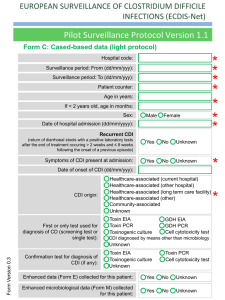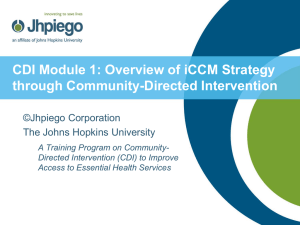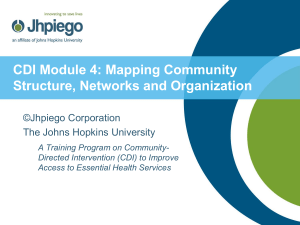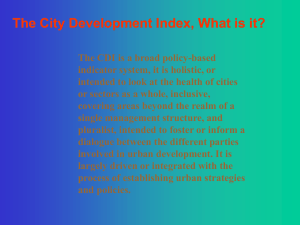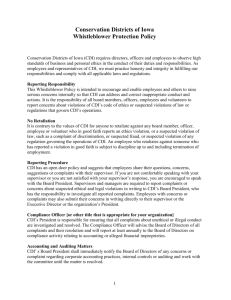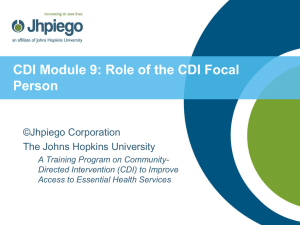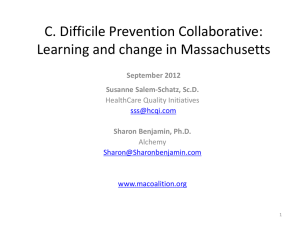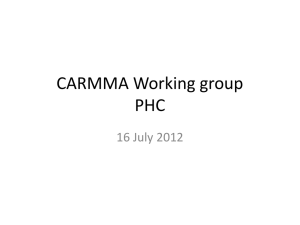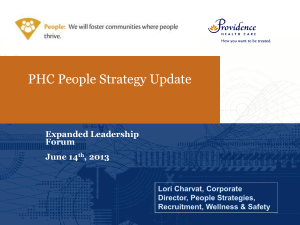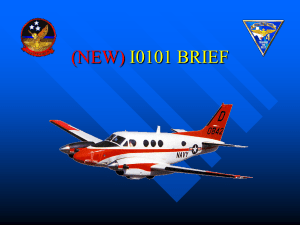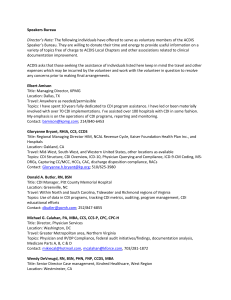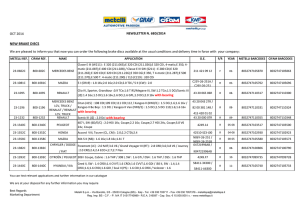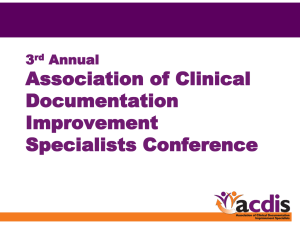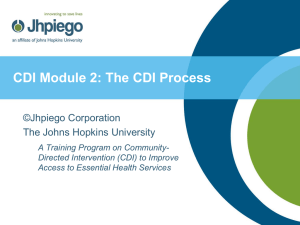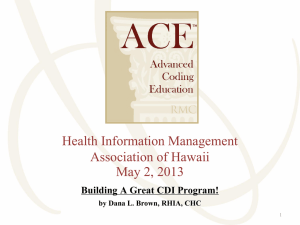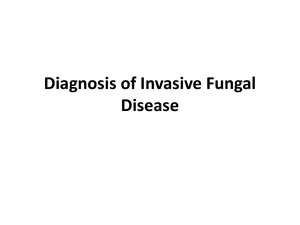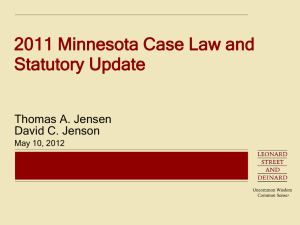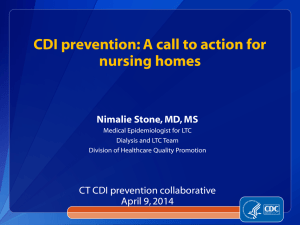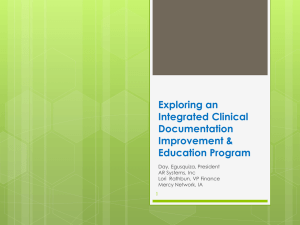Roles of Local Government CDI Team Members
advertisement
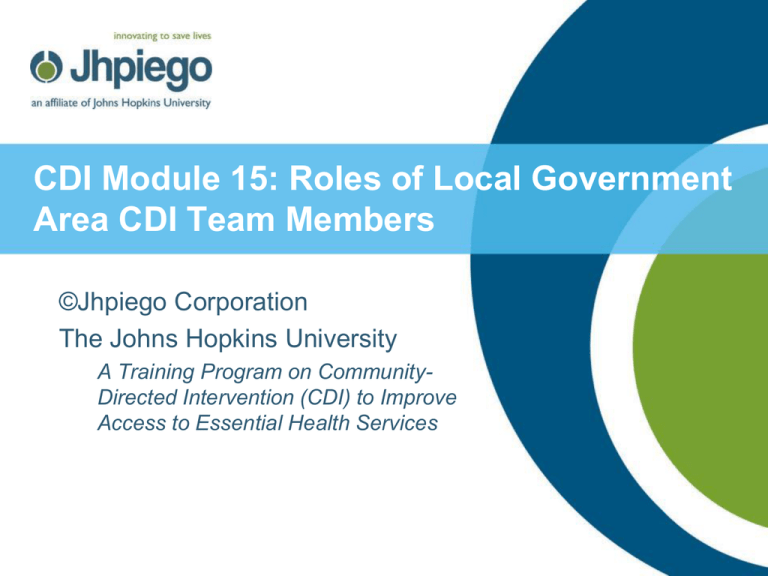
CDI Module 15: Roles of Local Government Area CDI Team Members ©Jhpiego Corporation The Johns Hopkins University A Training Program on CommunityDirected Intervention (CDI) to Improve Access to Essential Health Services Module 15 Objectives By the end of this module, learners will: Describe local government area (LGA)/district core team members and their roles Explain division of labor among various core team members Define a program coordinator and a facilitator— who they are and what they do Describe components of a work plan and its development process 2 State/Municipal Core Teams Train LGA/District Teams State/provincial teams will step-down or cascade the training of facilitators for community-directed intervention/integrated community case management (CDI/iCCM) to LGA/district level teams District teams include people involved in: Malaria control Onchocerciasis (river blindness) control Maternal and child health (MCH) Monitoring and evaluation (M&E) Procurement, logistics, supplies Health education and mobilization Other health interventions 3 Involve all LGA/District Members Who Were Trained The team may not be limited to the health department but may include people with relevant skills from finance, agriculture, education and community development, to name a few If someone attends training, be sure she or he continues to work with the team 4 Division of Work among LGA/District CDI Team Members Team member responsibility Suggested Comment number 1‒2 Malaria focal person and CDTI (oncho) focal person, if available BCC, mobilization, work with CSOs 2 Include people outside the health department Procurement, logistics, supplies 1 Program coordination Facilitators 3‒4 M&E, documentation 1‒2 Consider people who show good facilitation skills 5 The Program Coordinator’s Tasks The program coordinator: Maintains communication among all team members Leads work plan development Leads monthly review of work plan among team members Provides overall facilitation and supervision for CDI activities Liaises with government agencies (such as the Local Government Service Commission [LGSC]) and facilitators to ensure that trained facility staff are not frequently—and without restriction—transferred away from the local area where they were originally intended to work Liaises with other teams promoting community and household key practices at the LGA/district level to ensure cohesion and leveraging of resources 6 Suggest Additional Tasks for the Coordinator 7 Tasks for BCC and Mobilization BCC and mobilization tasks include: Obtaining stocks of relevant behavior change communication (BCC) materials from the Ministry of Health (MOH) and partners Disseminating materials to facilities and community-directed distributors (CDDs), and orienting them to proper use Conducting community meetings to: Introduce CDI Select CDDs Obtain community member support for the CDDs Conducting CDI/iCCM information sessions with communitybased organizations (CBOs) and community leaders Recruiting local civil society organizations (CSOs) to assist with education and advocacy efforts 8 Suggest Other Tasks for BCC, Mobilization 9 Tasks for Procurement, Logistics, Supplies Tasks for procurement, logistics and supplies include: Forecasting and ordering adequate medicines and supplies to meet CDI/iCCM needs Working with primary health care (PHC) facilities to refine their forecasting, including their determination of community supply needs Helping PHC facilities set up adequate and safe storage for all CDI/iCCM medicines and supplies Guiding PHC facilities in the logistics management and information system (LMIS), including the needs for the CDDs they supervise Working with CDI focal persons to provide supportive supervision and ensure that CDDs store medicines properly and appropriately 10 Suggest Additional Work for Procurement 11 The Facilitator’s Tasks The facilitator: Develops a training plan for PHC facility staff Develops, with the PHC facility CDI focal person, a training plan for CDDs Reviews CDI/iCCM curricula to ensure local relevance and adaptation, as needed Arranges training venues and adequate logistics Keeps records of all training activities and learners Facilitates PHC facility training Supervises CDD training by PHC facility staff Conducts supportive follow-up supervision 12 Suggest Additional Tasks for the District CDI Facilitator 13 Tasks for M&E, Documentation Tasks for M&E, documentation include: Ensuring that LGA/district recording and reporting forms capture all CDI/iCCM activities and services Orienting PHC facility staff and CDDs to the correct use of forms and the need for accurate and timely reporting Supervising data collection at the community and PHC facility levels, and ensuring that data are forwarded to the next level Ensuring that CDD data are included in PHC facility summary forms Documenting all CDI/iCCM activities (reports, photos, etc.), including success stories and challenges 14 Suggest Additional Tasks for M&E 15 First Team Task—Develop a Work Plan Activities, steps Dates from … to Responsible persons or groups Resources Indicators of success 1. Train facility staff 2. Help facility staff mobilize communities 3. Obtain needed medicines 4, Help facilities train CDDs • Brainstorm a list of key activities needed to implement CDI/iCCM in the LGA/district • Divide into LGA/district groupings • Produce draft work plan • Share with other teams • Use feedback to improve on plan • Revise plan again at home Actually conduct this planning exercise as a practical component of the training 16 Summary Activity Who should be members of the district team? What are the different roles for team members to perform? For each role mentioned, what are examples of tasks for those persons? What are the components of our district action plans? (Learners can wrap up the session by presenting their sample action plans) 17
